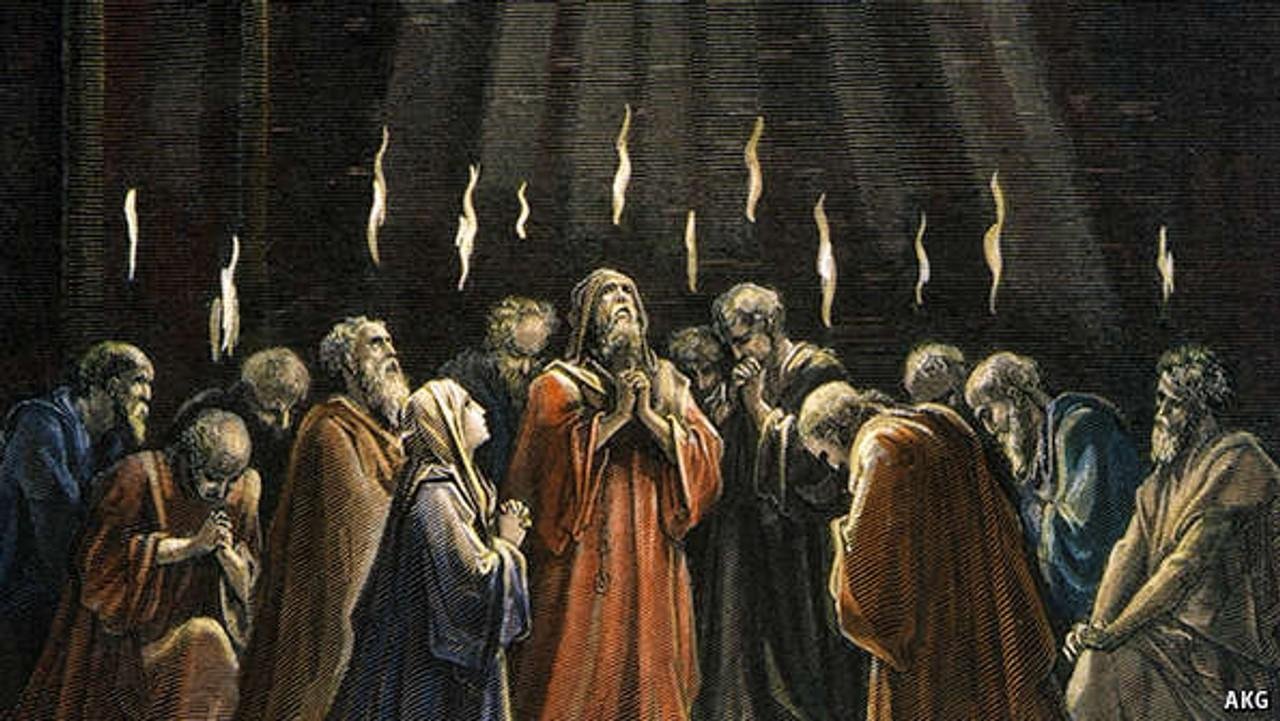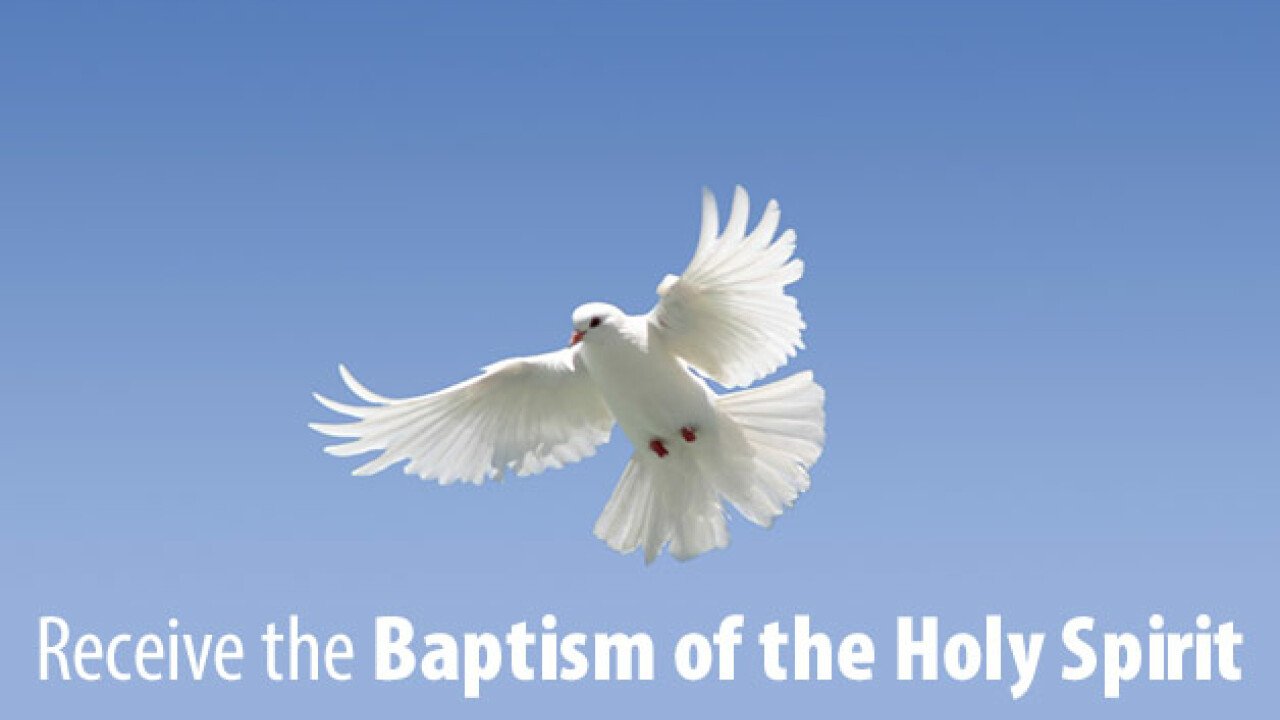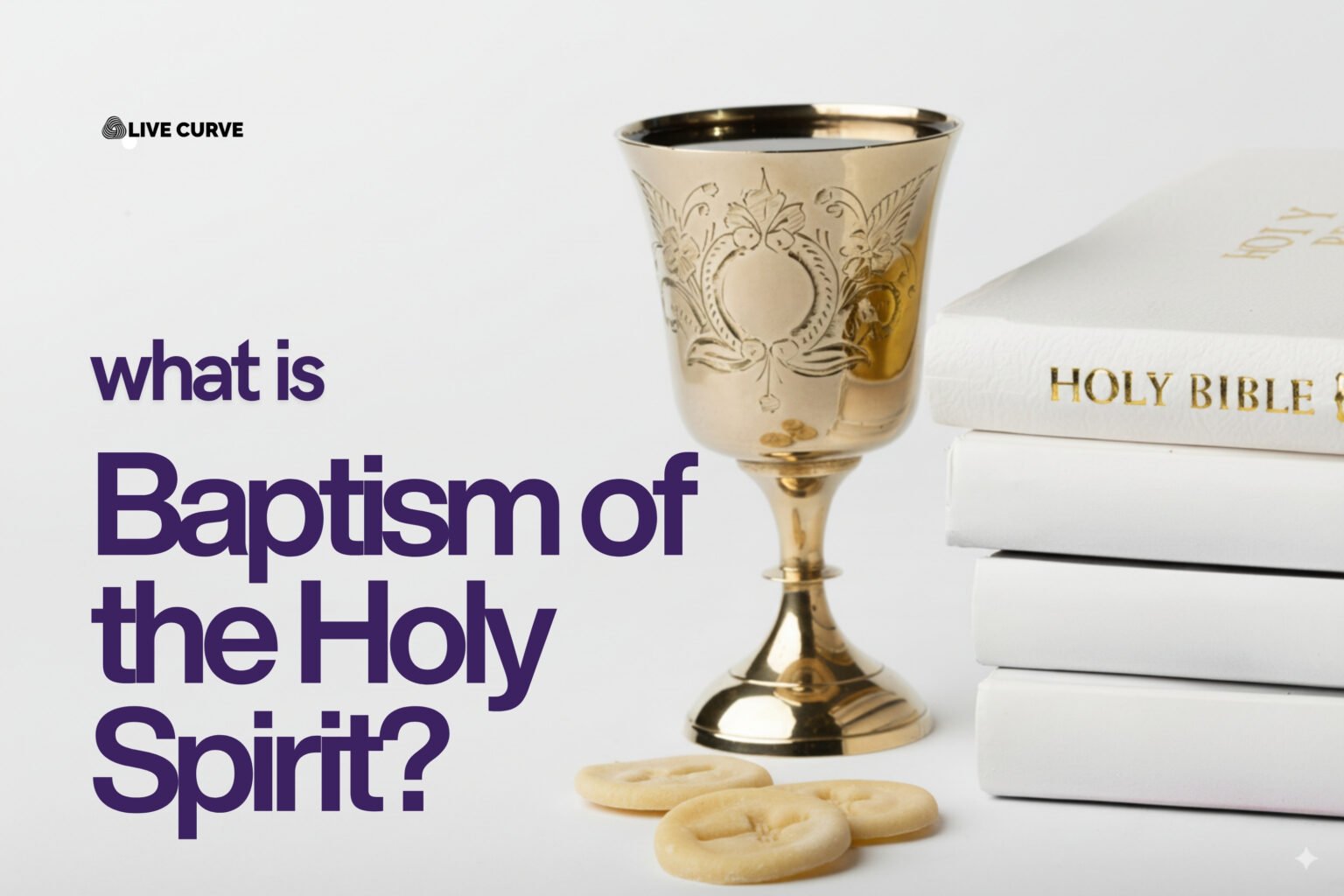The question, What is the baptism of the Holy Spirit has stirred believers for centuries. Most people believe it is a unique experience that comes with salvation, while others see it as the very act of entering into Christ’s body at conversion. The Bible itself gives us the viewpoints for knowing and understanding this doctrine, and scriptures, without basing our submissions on traditions or speculations.
In the Christian faith, we believe that the baptism of the Holy Spirit is Jesus’ work of immersing believers in the Spirit. John the Baptist foretold this in Mark 1:8: “I have baptized you with water, but He will baptize you with the Holy Spirit.” Luke confirms the promise when Christ told His disciples to wait until they were “soaked with power from on high” (Luke 24:49). This event first unfolded at Pentecost (Acts 2), where the Spirit was poured out, filling the disciples for witness.
As we journey together in this publication, we will unfold biblical meaning, events, and promises that led to Pentecost, the difference between water baptism and Spirit baptism, the gifts and fruit of the Spirit, and how believers today can live Spirit-filled lives. We aim to answer some pertinent questions, using scriptures in the Bible and, most importantly, our subject matter of what the baptism of the Holy Spirit truly is.
Defining the Baptism of the Holy Spirit in Scripture
The phrase “baptism of the Holy Spirit” is not invented by theologians; it has biblical roots. To understand it properly, we need to examine some passages where this term and its related expressions appear. Only then can we have a clear answer to the question: What is the baptism of the Holy Spirit?
Jesus’ Promise: The Spirit as Gift and Power
This was first introduced by John the Baptist in Mark 1:8, saying, “I baptized you with water, but He will baptize you with the Holy Spirit.” Here, John contrasts his temporary water baptism with the greater work of Christ. Water was symbolic; gives tells us that, Spirit baptism would be transformational.
In Acts 1:5, Jesus confirmed this promise: “John baptized with water, but you will be baptized with the Holy Spirit not many days from now.” This identifies Jesus as the one who immerses His disciples in the Spirit, an act that would empower them for their mission yet to come. Luke clarifies that the result of this baptism would be boldness and witness: “You will receive power when the Holy Spirit has come upon you, and you will be my witnesses” (Acts 1:8).
Thus, in the Gospels and Acts, the baptism of the Holy Spirit is not ritual as most people think it is, it is the Spirit’s outpouring, uniting God’s people to Christ and filling them with strength for service.
The Apostolic Witness: Spirit as Bond of Union
Another essential text is 1 Corinthians 12:13: “For in one Spirit we were all baptized into one body—Jews or Greeks, slaves or free—and all were made to drink of one Spirit.” Here, Apostle Paul emphasizes that the Spirit baptism is universal among believers. It is not for a select few, but for the entire body of Christ.
This passage shows us a second dimension: the baptism of the Holy Spirit is how believers are joined to Christ and incorporated into His church. The Spirit not only equips for ministry but also unites Christians across ethnic, cultural, and social boundaries. This unity is foundational to Christian identity, and Paul grounds it in Spirit baptism.
Drawing on both Acts and the Epistles, we see a two-fold meaning: the baptism of the Holy Spirit empowers for mission and secures union with Christ.
The Language of Outpouring and Filling
The Bible often describes Spirit baptism with related expressions:
- The Holy Spirit was poured out (Acts 2:33).
- The Holy Spirit fell upon them (Acts 10:44).
- They were filled with the Holy Spirit (Acts 2:4; 4:31).
We know that the terms may be different, but the imagery is consistent. God gives His Spirit abundantly. The “gift of the Holy Spirit” (Acts 2:38) represents God’s promise fulfilled in every believer who repents and trusts Christ.
While some traditions separate “Spirit baptism” from “Spirit filling,” the New Testament uses these ideas together: one baptism at conversion, with repeated fillings for renewed power and boldness.
Defining the Term Biblically
The Bible gives this answer to the same question: “What is the baptism of the Holy Spirit?” It is the act of Jesus immersing every believer in the Spirit, uniting them to His body, and empowering them to live as witnesses. The event first occurred at Pentecost, but its reality continues in the life of every Christian today.
Looking at passages like Mark 1:8, Acts 1:5, and 1 Corinthians 12:13, we see that Spirit baptism is not optional, nor is it a second-class experience. It is the shared reality of all who belong to Christ, marked by the Spirit’s presence, gifts, and fruit.
Promises of the Spirit Before Pentecost
As believers, it is important to see that this was not a sudden idea in the New Testament. The Old Testament laid a strong foundation by anticipating a future outpouring of God’s Spirit. These promises prepared Israel for a transformation, renewal, and empowerment that would one day come through Christ.
Joel’s Prophecy of the Spirit
Joel 2:28–29 in the Old Testament gives a clearer insight: “And it shall come to pass afterward, that I will pour out my Spirit on all flesh; your sons and your daughters shall prophesy, your old men shall dream dreams, and your young men shall see visions. Even on the male and female servants in those days, I will pour out my Spirit.”
This prophecy shows that the Spirit’s work would not be restricted to kings, prophets, or priests, as in Israel’s history. Instead, the baptism of the Holy Spirit would extend to all people, men and women, young and old, rich and poor. When Peter preached at Pentecost (Acts 2:16–18), he declared that Joel’s words had been fulfilled, linking the baptism of the Holy Spirit directly to this promise.
Ezekiel’s Vision of Renewal
Ezekiel 36:26–27 adds another layer: “I will give you a new heart, and a new spirit I will put within you… And I will put my Spirit within you, and cause you to walk in my statutes and be careful to obey my rules.”
Here, the promise of the Spirit focuses on transformation from within. The baptism of the Holy Spirit was not merely about external power but about inward renewal, enabling obedience and devotion to God. This shows the Spirit’s role in salvation itself—making new hearts and lives.
Isaiah’s Imagery of Living Water
Isaiah 44:3 uses imagery: “For I will pour water on the thirsty land, and streams on the dry ground; I will pour my Spirit upon your offspring, and my blessing on your descendants.” This language of water ties into Jesus’ teaching in John 7:37–39, where He promised rivers of living water to those who believed.
This shows that the baptism of the Holy Spirit is the fulfillment of long-awaited awakening, bringing life where there was barrenness.
The Old Testament anticipated a day when God would pour out His Spirit abundantly on all His people. Joel emphasized universality, Ezekiel stressed transformation, and Isaiah promised refreshing power. All three find their fulfillment in Pentecost, where the baptism of the Holy Spirit became the lived experience of Christ’s followers.
Jesus’ Teaching on the Baptism of the Holy Spirit

When we ask, “What is the baptism of the Holy Spirit?”, the most reliable place to begin is with the words of Jesus Himself. He not only affirmed John the Baptist’s prophecy but also clarified its meaning and purpose. His teaching provides the clearest framework for how believers should understand this gift.
The Promise of the Father
In Luke 24:49, Jesus told His disciples, “Behold, I am sending the promise of my Father upon you. But stay in the city until you are endowed with power from on high.” Here, Jesus connects the Spirit’s baptism to God’s promises, such as those found in Joel, Ezekiel, and Isaiah. The phrase “clothed with power” reveals that the baptism of the Holy Spirit would equip His followers for their mission. This was not an optional add-on but an essential provision for the work ahead.
Waiting in Jerusalem
In Acts 1:4–5, Jesus reinforced the importance of this coming baptism: “Do not depart from Jerusalem, but wait for the promise of the Father… for John baptized with water, but you will be baptized with the Holy Spirit not many days from now.” The disciples had already walked with Christ, yet they still lacked the Spirit’s empowering presence. By commanding them to wait, Jesus showed that human strength could never accomplish the Great Commission. The baptism of the Holy Spirit would be the decisive turning point.
Power for Witness
Jesus gave the clearest explanation in Acts 1:8: “You will receive power when the Holy Spirit has come upon you, and you will be my witnesses in Jerusalem and in all Judea and Samaria, and to the end of the earth.” The purpose of Spirit baptism is not private experience alone but public proclamation. The Spirit enables believers to declare Christ boldly and effectively across all cultures and nations.
This verse also connects the baptism of the Holy Spirit to the expansion of God’s kingdom. The Spirit was not given to create division but to empower mission. Witnessing in the face of persecution, speaking truth with courage, and crossing cultural boundaries all flow from the Spirit’s baptism.
The Central Role of Jesus
It is important to remember that Jesus is the one who baptizes with the Spirit (Mark 1:8; John 1:33). The baptism of the Holy Spirit is the gift of Christ Himself, poured out as evidence of His exaltation and authority (Acts 2:33).
Jesus taught that the baptism of the Holy Spirit is the Father’s promise, fulfilled by the Son, and designed to empower His people for witness. It is rooted in God’s covenant plan, necessary for the church’s mission, and central to the Christian life. By looking to Christ’s teaching, we see that Spirit baptism is both a gift to receive and a power to walk in daily.
Pentecost and the Baptism of the Holy Spirit

When considering the question of baptism of the holy spirit, we cannot overlook the Day of Pentecost. This historic moment in Acts 2 is where the promise Jesus gave was first fulfilled, and it set the pattern for how the Spirit works in the church. Pentecost was not only a dramatic event but also a theological milestone in God’s plan of redemption.
The Setting of Pentecost
Acts 2 begins with the disciples gathered in one place, waiting in obedience to Christ’s command (Acts 1:4). Pentecost was a Jewish feast held fifty days after Passover, a time when Jerusalem was filled with pilgrims from across the known world. God chose this moment of maximum visibility to pour out His Spirit, showing that the baptism of the Holy Spirit was not meant for Israel alone but for all nations.
The Spirit Poured Out
Luke describes the moment vividly: “Suddenly there came from heaven a sound like a mighty rushing wind, and it filled the entire house… and divided tongues as of fire appeared to them and rested on each one of them. And they were all filled with the Holy Spirit and began to speak in other tongues as the Spirit gave them utterance” (Acts 2:2–4).
Here we see the first fulfillment of Christ’s promise: the Spirit was poured out, the disciples were filled, and supernatural gifts confirmed God’s presence. This was the baptism of the Holy Spirit in action—empowering ordinary men and women to declare the mighty works of God in languages they had never learned.
Peter’s Explanation
When the crowd gathered, confused by what they heard, Peter stood and preached. He explained that this event fulfilled Joel’s prophecy: “I will pour out my Spirit on all flesh” (Acts 2:17). Peter’s sermon made clear that the baptism of the Holy Spirit was not random but rooted in God’s Word.
He connected the Spirit’s outpouring to Christ’s exaltation: “Being therefore exalted at the right hand of God, and having received from the Father the promise of the Holy Spirit, He has poured out this that you yourselves are seeing and hearing” (Acts 2:33). Thus, Pentecost was proof that Jesus had risen, ascended, and now reigned as Lord.
The Call to Repent and Receive
Peter ended with a call: “Repent and be baptized every one of you in the name of Jesus Christ for the forgiveness of your sins, and you will receive the gift of the Holy Spirit. For the promise is for you and for your children and for all who are far off, everyone whom the Lord our God calls to Himself” (Acts 2:38–39).
This passage shows that the baptism of the Holy Spirit was not confined to the apostles. It was extended to all who would turn to Christ, including future generations and distant nations. The Spirit’s baptism was—and is—a universal promise for every believer.
Theological Significance
Pentecost marked the beginning of the church, empowered by the Spirit for mission. It demonstrated that the baptism of the Holy Spirit unites believers, equips them with gifts, and launches them into bold witness. It was not a one-time phenomenon but the foundation of ongoing Spirit-filled life.
Pentecost answers the question, “What is the baptism of the Holy Spirit?” by showing it in action: the Spirit poured out, believers filled, Christ exalted, and the gospel proclaimed. From that day forward, the Spirit’s baptism became the mark of God’s people and the power behind their mission.
Union With Christ Through the Spirit
The question “What is the baptism of the Holy Spirit?” cannot be fully answered by looking at Pentecost alone. The book of Acts emphasizes empowerment for witness, but the letters of Paul reveal a deeper truth: the baptism of the Holy Spirit is how believers are joined to Christ Himself. It is both an individual and corporate reality, binding every Christian into one body.
Baptized Into One Body
Paul explains in 1 Corinthians 12:13: “For in one Spirit we were all baptized into one body—Jews or Greeks, slaves or free—and all were made to drink of one Spirit.”
This verse teaches several important truths:
- Universality: All believers, without exception, have been baptized in the Holy Spirit. It is not an elite experience but the shared reality of the whole church.
- Unity: Ethnic, social, and cultural differences do not divide the Spirit’s work. By one baptism, the church becomes one body.
- Satisfaction: To “drink of one Spirit” suggests ongoing refreshment and life in Christ, echoing Jesus’ promise of living water (John 7:37–39).
This passage defines Spirit baptism not merely as power for ministry but as the very foundation of Christian identity.
The Spirit as Seal and Guarantee
In Ephesians 1:13–14, Paul writes: “In Him you also, when you heard the word of truth, the gospel of your salvation, and believed in Him, were sealed with the promised Holy Spirit, who is the guarantee of our inheritance until we acquire possession of it, to the praise of His glory.”
The baptism of the Holy Spirit is linked to salvation itself. The Spirit seals believers, marking them as God’s own and guaranteeing their eternal inheritance. This shows that every Christian who believes the gospel receives the Spirit at conversion. The Spirit is not a later addition but God’s pledge of redemption.
New Life Through the Spirit
Romans 8:9 makes this clear: “Anyone who does not have the Spirit of Christ does not belong to Him.” In other words, to belong to Christ is to be indwelt by the Spirit. The baptism of the Holy Spirit is inseparable from salvation—it is how God brings new life to dead hearts, making sinners His children.
Paul expands this idea in Galatians 3:26–28: “For in Christ Jesus you are all sons of God, through faith. For as many of you as were baptized into Christ have put on Christ… there is neither Jew nor Greek, slave nor free, male nor female, for you are all one in Christ Jesus.” Spirit baptism brings believers into union with Christ and with each other.
One Baptism, One Faith, One Spirit
Ephesians 4:4–6 sums this up beautifully: “There is one body and one Spirit—just as you were called to the one hope that belongs to your call—one Lord, one faith, one baptism, one God and Father of all, who is over all and through all and in all.”
Here Paul underscores the unity created by the baptism of the Holy Spirit. Just as there is one faith and one Lord, so there is only one Spirit baptism, shared by all who believe. This truth counters any idea that Christians are divided into “Spirit-baptized” and “non–Spirit-baptized.” In biblical teaching, every believer is Spirit-baptized.
Implications for the Church
Understanding the baptism of the Holy Spirit as union with Christ has profound implications:
- Identity: Christians find their true identity in being united with Christ through the Spirit.
- Community: Spirit baptism destroys barriers of race, gender, and class, forming one diverse but united church.
- Assurance: Believers can have confidence that they belong to God because the Spirit has sealed them.
- Mission: The Spirit not only empowers but also unites the church for a common calling.
The baptism of the Holy Spirit is more than an empowering event; it is the act by which Christ unites His people to Himself and to one another. In 1 Corinthians 12:13, Paul teaches that every believer has received this baptism, regardless of background or experience. Romans 8, Galatians 3, and Ephesians 1 affirm that the Spirit’s presence is inseparable from salvation.
Thus, when we ask “What is the baptism of the Holy Spirit?”, the Bible answers: It is the Spirit’s work of joining believers to Christ, sealing them for salvation, and forming them into one body. This truth grounds Christian identity and fuels the unity of the church across the world.
Gifts and Evidence of the Holy Spirit

A key question people ask is, “how do we know the baptism of the holy spirit has taken place?” In Scripture, this baptism is always accompanied by visible evidence, but the evidence varies. Some moments emphasize extraordinary signs like tongues, while others highlight transformed lives and bold witness. To understand this clearly, we must examine both Acts and the Epistles.
Signs in the Book of Acts
The book of Acts records several major outpourings of the Spirit:
- Pentecost (Acts 2) – The Spirit was poured out, believers were filled, and they spoke in other tongues. This marked the beginning of the church and demonstrated that the Spirit was for all nations.
- Samaria (Acts 8:14–17) – The apostles laid hands on new believers, and they received the Holy Spirit. While tongues are not explicitly mentioned, there was visible evidence powerful enough to astonish Simon the magician (v. 18).
- Cornelius’ Household (Acts 10:44–46) – As Peter preached, the Spirit fell, and the Gentiles spoke in tongues and praised God. This showed that non-Jews were equally included in the baptism of the Holy Spirit.
- Ephesus (Acts 19:1–7) – When Paul prayed for them, disciples spoke in tongues and prophesied after receiving the Spirit.
These events highlight that the Spirit’s baptism could manifest in diverse ways: tongues, prophecy, praise, and joy. However, the purpose was consistent—demonstrating that the gospel unites Jews, Samaritans, Gentiles, and all nations under one Spirit.
Diversity of Spiritual Gifts
Paul explains in 1 Corinthians 12 that the Spirit gives a variety of gifts to believers: wisdom, knowledge, faith, healing, miracles, prophecy, discernment, tongues, and interpretation (vv. 8–10). All these are distributed “as He wills” (v. 11). This means that while tongues were a common sign in Acts, they are not the only evidence of the baptism of the Holy Spirit.
Paul presses this point in 1 Corinthians 12:29–30: “Are all apostles? Are all prophets? Are all teachers? Do all work miracles? Do all possess gifts of healing? Do all speak with tongues? Do all interpret?” The implied answer is no. Not every believer receives the same gift. Therefore, to insist that tongues are the necessary proof of Spirit baptism goes against Paul’s teaching.
The Fruit of the Spirit
Beyond gifts, Paul emphasizes character transformation as evidence of the Spirit’s work. In Galatians 5:22–23 he lists the fruit of the Spirit: love, joy, peace, patience, kindness, goodness, faithfulness, gentleness, and self-control.
While gifts may vary, the fruit should be present in every believer’s life. The baptism of the Holy Spirit results in a new way of living that reflects Christ. This ongoing transformation may not be as dramatic as tongues or prophecy, but it is equally powerful and essential.
Boldness and Witness
Another sign of Spirit baptism is courage in proclamation. In Acts 4:31, after the believers prayed, “they were all filled with the Holy Spirit and continued to speak the word of God with boldness.” Notice that this filling came after Pentecost, showing that Spirit-empowered witness is an ongoing reality, not a one-time event.
This boldness is itself evidence that the baptism of the Holy Spirit has taken place. Fearful disciples were transformed into fearless witnesses who preached Christ even under threat of death.
Clarifying Misunderstandings
Some traditions equate Spirit baptism exclusively with tongues. Others downplay any outward manifestation. A balanced biblical view recognizes that:
- Tongues and prophecy are legitimate signs, but not universal.
- Gifts are diverse, given by the Spirit as He wills.
- The fruit of the Spirit is the enduring evidence of Spirit-filled life.
- Bold witness is a hallmark of Spirit baptism across the New Testament.
This balance prevents us from narrowing the baptism of the Holy Spirit to one gift while also avoiding the mistake of stripping it of power and evidence altogether.
So, what is the baptism of the Holy Spirit, and what evidence does it bring? It is Christ’s work of immersing believers in the Spirit, uniting them to His body, and empowering them for mission. Its evidence may include tongues, prophecy, praise, and boldness, as recorded in Acts. It always results in spiritual gifts distributed according to God’s will. Most importantly, it produces the fruit of the Spirit—lasting transformation into Christ’s likeness.
The baptism of the Holy Spirit is not measured by one gift but by the presence of the Spirit Himself, who equips, empowers, and sanctifies every believer.
Comparison Between Baptism in Water and Baptism of the Holy Spirit

Asking the question “What is the baptism of the Holy Spirit?”, a lot of people often confuse it with water baptism. Both are essential in the Christian life, but they are not the same. Scripture carefully distinguishes between the outward sign of water baptism and the inward reality of Spirit baptism.
Water Baptism: Outward Sign of Faith
Jesus commanded His disciples in Matthew 28:19 to “go therefore and make disciples of all nations, baptizing them in the name of the Father and of the Son and of the Holy Spirit.” This act of immersion in water is a visible confession of faith in Christ. Paul describes it in Romans 6:3–4 as a symbol of union with Christ in His death and resurrection: “We were buried therefore with Him by baptism into death, in order that, just as Christ was raised from the dead by the glory of the Father, we too might walk in newness of life.”
Water baptism is a public testimony. It marks repentance, faith, and identification with Jesus. Yet, while essential as obedience, water baptism itself does not impart the Spirit. It is symbolic, pointing to a deeper reality.
Spirit Baptism: Inward Reality of Union
The baptism of the Holy Spirit, by contrast, is an inward work of God. As Paul states in 1 Corinthians 12:13, “For in one Spirit we were all baptized into one body.” Here no water is mentioned. Instead, the Spirit Himself unites believers to Christ and incorporates them into His church.
This Spirit baptism is invisible to the eye, but its effects are undeniable: new life, spiritual gifts, and transformation of character. It is the fulfillment of promises like Ezekiel 36:27, “I will put my Spirit within you, and cause you to walk in my statutes.”
Distinct Yet Complementary
Though distinct, water baptism and Spirit baptism are not in conflict. In fact, the New Testament shows them working together. On the Day of Pentecost, Peter declared: “Repent and be baptized every one of you in the name of Jesus Christ for the forgiveness of your sins, and you will receive the gift of the Holy Spirit” (Acts 2:38). Here repentance, water baptism, and the baptism of the Holy Spirit are linked, though not identical.
The outward act bears witness to the inward reality. Water baptism symbolizes cleansing and union with Christ, while Spirit baptism accomplishes it. Both are important: one as testimony, the other as transformation.
To confuse water baptism with the baptism of the Holy Spirit is to miss the richness of both. Water baptism is the believer’s public declaration of faith, commanded by Christ. The baptism of the Holy Spirit is Christ’s gift, uniting believers inwardly to Himself and empowering them with new life.
Together, they remind us that Christianity is both visible and invisible, outward and inward. One is a sign; the other is the substance. When we ask, “What is the baptism of the Holy Spirit?”, we must see it not as water baptism, but as the Spirit’s work of making us one with Christ and His people.
One Baptism, Many Fillings
A common question is, “What is the baptism of the Holy Spirit, and how does it differ from being filled with the Spirit?” The New Testament uses both terms, but they do not mean the same thing. Understanding the difference is crucial for grasping the Spirit’s work in the Christian life.
One Baptism: A Once-for-All Reality
Paul teaches in 1 Corinthians 12:13: “For in one Spirit we were all baptized into one body… and all were made to drink of one Spirit.” Here baptism of the Holy Spirit is presented as a completed act. Every believer, at the moment of conversion, is immersed in the Spirit and incorporated into Christ’s body.
This baptism is not repeated. Just as there is one Lord and one faith, Paul says in Ephesians 4:5 there is “one baptism.” The baptism of the Holy Spirit happens once, uniting the believer to Christ permanently. It cannot be undone or improved upon.
Thus, when we ask “What is the baptism of the Holy Spirit?” the answer includes this definitive work: Jesus immerses us into His Spirit when we believe, giving us new life and sealing us for eternity.
Many Fillings: A Continuous Experience
While Spirit baptism is once-for-all, being filled with the Spirit is ongoing. In Acts 2, the disciples were filled with the Spirit at Pentecost. Yet in Acts 4:31, the same believers were filled again as they prayed for boldness. Paul commands in Ephesians 5:18, “Do not get drunk with wine… but be filled with the Spirit.”
This shows that filling is not automatic or permanent. It must be sought continually through prayer, obedience, and faith. The Spirit fills believers to equip them for specific tasks, to give boldness in witness, and to produce fruit in their daily walk.
In other words, baptism brings us into Christ, but filling empowers us to live for Christ day by day.
Why the Distinction Matters
Confusing baptism and filling can lead to two opposite errors. Some believers think they must “seek” the baptism of the Holy Spirit as a second blessing after salvation. But Scripture shows it is already theirs in Christ (Rom 8:9; Gal 3:27). Others assume that because they have been baptized in the Spirit, they need no further empowerment. Yet the apostles themselves sought fresh fillings for strength and courage.
The distinction helps us appreciate both truths: one baptism unites us to Christ forever, while many fillings refresh and empower us for faithful living.
Practical Implications
- Confidence — Knowing you have already received the baptism of the Holy Spirit assures you of belonging to Christ.
- Dependence — Recognizing your need for ongoing fillings keeps you humble and prayerful.
- Mission — The Spirit’s fresh fillings equip you to share the gospel boldly, as seen in Acts 4.
- Growth — Continual filling produces the fruit of the Spirit (Gal 5:22–23), shaping your character over time.
To summarize, what is the baptism of the Holy Spirit? It is the once-for-all work of Christ uniting believers to Himself and sealing them in His body. Yet alongside this, Scripture calls us to be filled with the Spirit repeatedly, experiencing fresh power for witness, holiness, and service.
The Christian life, then, is not about chasing another baptism but about walking in continual filling. One baptism secures our place in Christ; many fillings enable us to live it out.
How Believers Receive the Baptism of the Holy Spirit

When we ask, “What is the baptism of the Holy Spirit, and how can a believer receive it?” the Bible gives a clear and hopeful answer. The baptism of the Holy Spirit is not a privilege for a few; it is the promise of God to all who repent and believe in Christ.
Receiving the Spirit at Conversion
Peter declared on the Day of Pentecost: “Repent and be baptized every one of you in the name of Jesus Christ for the forgiveness of your sins, and you will receive the gift of the Holy Spirit” (Acts 2:38). The promise extends “to you and your children and for all who are far off, everyone whom the Lord our God calls” (v. 39).
This means that the baptism of the Holy Spirit is given at the moment of salvation. Turning to Christ in faith brings both forgiveness and the indwelling Spirit. Romans 8:9 confirms: “Anyone who does not have the Spirit of Christ does not belong to Him.” Every believer, therefore, has already received the baptism of the Holy Spirit.
Asking and Abiding
At the same time, Jesus encouraged His disciples to keep asking: “How much more will the heavenly Father give the Holy Spirit to those who ask Him!” (Luke 11:13). This is not about receiving the Spirit for the first time, but about experiencing His ongoing filling and empowerment.
Walking in Spirit power requires continual dependence—prayer, Scripture meditation, and obedience. Jesus promised in John 14:16–17 that the Spirit would “dwell with you and will be in you.” Abiding in Christ (John 15:5) ensures that the Spirit’s presence is active and fruitful in our lives.
Evidence of Walking in the Spirit
To walk in Spirit power is to live under His influence daily. Paul urges in Galatians 5:16: “Walk by the Spirit, and you will not gratify the desires of the flesh.” The evidence is seen in both fruit and boldness:
- Fruit of the Spirit (Gal 5:22–23): love, joy, peace, patience, kindness, goodness, faithfulness, gentleness, and self-control.
- Bold witness (Acts 4:31): courage to proclaim Christ despite opposition.
- Holiness (Rom 8:13–14): putting sin to death and following God’s leading.
These show that the baptism of the Holy Spirit is not static—it is the beginning of a lifelong journey of growth and power.
Practical Steps for Believers
- Repent and believe in Christ — the Spirit is given at conversion.
- Pray continually for fresh filling and strength.
- Immerse yourself in Scripture, where the Spirit speaks and guides.
- Obey God’s leading quickly, not quenching the Spirit (1 Thess 5:19).
- Stay in fellowship, since the Spirit unites us as one body.
So, what is the baptism of the Holy Spirit, and how do we receive it? It is the Spirit’s gift at salvation, promised to every believer. We continue to walk in His power by abiding in Christ, asking for His filling, and living in obedience. The baptism of the Holy Spirit begins our life in Christ, while ongoing filling sustains us for witness, holiness, and joy.
Conclusion: Living Out the Baptism of the Holy Spirit Today
After exploring the question, “What is the baptism of the Holy Spirit?”, we can conclude that it is both a defining and empowering reality for every believer. According to Scripture, this baptism takes place at conversion, uniting us to Christ and His body, sealing us for salvation, and equipping us with the Spirit’s presence.
Yet this once-for-all baptism is only the beginning of a Spirit-filled life. Believers are called to seek continual fillings of the Spirit—renewed strength for witness, fresh boldness in prayer, and growth in the fruit of the Spirit. The Christian life is not lived in our own power but in daily dependence on the Spirit poured out at Pentecost and promised to every generation (Acts 2:38–39).
To live out this baptism is to walk in faith, abide in Christ, and yield to the Spirit’s leading every day.
Frequently Asked Questions on the Baptism of the Holy Spirit
When people hear the phrase “baptism of the Holy Spirit,” they often have questions. Is it different from conversion? Does everyone receive it? Are tongues required? The New Testament gives us clear answers. Below are some of the most frequent questions people ask, and our answers to them, along with biblical explanations.
Does every believer receive the baptism of the Holy Spirit?
Yes. Paul states in 1 Corinthians 12:13: “For in one Spirit we were all baptized into one body.” He emphasizes universality—all believers have been baptized into Christ’s body by the Spirit. Similarly, Romans 8:9 says: “Anyone who does not have the Spirit of Christ does not belong to Him.”
This means there are no “second-class” Christians. Every person who truly believes in Jesus has already received the baptism of the Holy Spirit.
Is speaking in tongues the necessary evidence of Spirit baptism?
No. Tongues were often present in Acts (Acts 2, Acts 10, Acts 19), but Paul makes it clear that not all speak in tongues. In 1 Corinthians 12:29–30, he asks: “Do all speak with tongues? Do all interpret?” The implied answer is no.
The Spirit distributes gifts as He wills (1 Cor 12:11). While tongues are a valid and powerful gift, they are not the universal sign. The enduring evidence of the baptism of the Holy Spirit is the fruit of the Spirit (Gal 5:22–23) and boldness in witness (Acts 4:31).
What is the difference between baptism in the Spirit and being filled with the Spirit?
The baptism of the Holy Spirit is a one-time event at salvation. It unites believers to Christ and incorporates them into His body (1 Cor 12:13). Being filled with the Spirit, however, is ongoing. Acts 4:31 shows believers who were filled again after Pentecost, and Ephesians 5:18 commands Christians to “be filled with the Spirit.”
In short, baptism establishes our new life in Christ; filling empowers us repeatedly for service, holiness, and witness.
How does the baptism of the Holy Spirit affect daily life?
Spirit baptism is not only about extraordinary gifts but also about ordinary transformation. The Spirit indwells believers, giving them the ability to resist sin and live in holiness (Rom 8:13–14). He produces fruit such as love, joy, peace, patience, and self-control (Gal 5:22–23).
Additionally, the Spirit empowers believers for mission. Jesus promised, “You will receive power when the Holy Spirit has come upon you, and you will be my witnesses” (Acts 1:8). This witness is seen when ordinary Christians live boldly for Christ in their homes, workplaces, and communities.
What role does water baptism play in relation to Spirit baptism?
Water baptism and Spirit baptism are distinct but complementary. Water baptism is the outward sign of faith and obedience, commanded by Jesus (Matt 28:19). It symbolizes death to sin and new life in Christ (Rom 6:3–4).
Spirit baptism, on the other hand, is the inward reality accomplished by Christ. It unites us to His body, seals us for salvation, and empowers us for mission. Both belong together: one is the sign, the other the substance.
Can the baptism of the Holy Spirit be lost?
No. The Spirit’s baptism is permanent. Ephesians 1:13–14 says believers are “sealed with the promised Holy Spirit, who is the guarantee of our inheritance until we acquire possession of it.” Once Christ baptizes someone in the Spirit, that person belongs to Him forever.
However, while baptism cannot be lost, the filling of the Spirit can be neglected or quenched (1 Thess 5:19). Believers must walk in obedience, prayer, and fellowship to enjoy the Spirit’s ongoing empowerment.
Why do different churches teach different views on Spirit baptism?
Differences arise from how people read the book of Acts and Paul’s letters. Some emphasize the dramatic signs in Acts and conclude that Spirit baptism is a separate experience after salvation. Others emphasize Paul’s teaching in 1 Corinthians 12:13 and Romans 8:9, seeing Spirit baptism as identical with conversion.
A balanced approach recognizes that baptism of the Holy Spirit happens at salvation for every believer, while fillings may happen repeatedly for renewed power. This perspective honors both Acts and the Epistles.
So, what is the baptism of the Holy Spirit, according to the Bible? It is the act of Jesus uniting every believer to Himself and His body through the Spirit at conversion. Tongues may accompany it, but they are not required. Its daily effects are seen in holiness, spiritual fruit, and boldness in witness. Water baptism testifies outwardly to what Spirit baptism accomplishes inwardly. And while filling must be sought again and again, Spirit baptism itself is permanent.
By grounding our answers in Scripture, we see that the baptism of the Holy Spirit is both universal and transformative, equipping believers to live for Christ in every generation.
Prayer Points on the Baptism of the Holy Spirit
These prayer points flow directly from the Scriptures highlighted in your article outline, keeping them biblical, Spirit-led, and practical.
Thanksgiving for the Gift of the Spirit
- Lord, thank You that through the baptism of the Holy Spirit You have united me to Christ and made me part of His body (1 Corinthians 12:13).
- Thank You for sealing me with the Spirit as a guarantee of my salvation (Ephesians 1:13–14).
Fresh Filling and Empowerment
- Father, fill me afresh with the Holy Spirit today (Ephesians 5:18).
- Lord, clothe me with power from on high to be Your witness in my home, community, and to the ends of the earth (Acts 1:8).
Boldness in Witness
- Holy Spirit, grant me boldness to share the gospel without fear, just as You filled the early church with courage (Acts 4:31).
- Help me speak with clarity, wisdom, and love so that Christ is exalted.
Manifestation of Spiritual Gifts
- Lord, stir up the gifts of the Spirit within me, according to Your will (1 Corinthians 12:7–11).
- Help me to use every gift for the building up of Your church and the glory of Christ.
Fruit of the Spirit in Daily Life
- Holy Spirit, cultivate in me love, joy, peace, patience, kindness, goodness, faithfulness, gentleness, and self-control (Galatians 5:22–23).
- May my life reflect Christ’s character more each day.
Walking in Obedience and Holiness
- Lord, empower me to walk by the Spirit and not gratify the desires of the flesh (Galatians 5:16).
- Help me to yield quickly to Your leading and avoid quenching the Spirit (1 Thessalonians 5:19).
Unity in the Body of Christ
- Father, thank You that the baptism of the Holy Spirit unites all believers into one body. Help me to walk in unity with other Christians (Ephesians 4:4–6).
- Remove divisions and teach us to love one another as members of Christ’s body.
Renewal and Refreshing
- Lord, pour out Your Spirit like rivers of living water into the dry areas of my life (John 7:37–39; Isaiah 44:3).
- Revive me, refresh me, and renew my passion for You.














